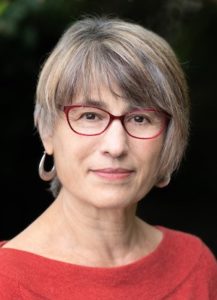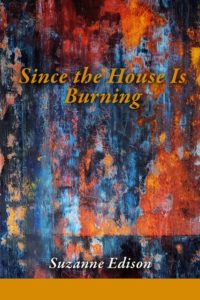
 Review by Claudia Putnam
Review by Claudia Putnam
In the title poem of this debut collection, the speaker’s father has a saying: Since the house is burning, let us warm ourselves. The house is surely burning. We may be frightened, but there’s comfort here, too. Humans grew up with fire, sharing experiences of loss and beauty that perhaps have warmed us more than the literal fuels that got us into this mess. What a gorgeous, painful, even paralyzing paradox.
So many poets are writing about climate change and other, mostly related, disasters in a glancing way. Yes, the house is burning, but I still made a cake. The house may be burning, but I can’t think about it all the time—can you? There seems to be a desperation to find a positive in all this fire and brimstone. There’s still love! There’s still light! “No one wants to talk about the sick child,” Edison writes.
Edison’s collection, though not without its influences—Robert Hass, Erin Belieu, Kelli Russell Agodon, Ada Limón—is distinctive. Sure, there’s plenty of love, but the speakers of these poems never glance away from the flames. Since none of us can escape, why not look even more closely at everything we will lose? Thanks to Edison’s muscular empathy, no one burns alone.
What greater conflagration than parental love? Edison’s own child has suffered from a terrible, unexplained illness (“treatment, no cure”). She grieves for other children and their parents in similar situations. Children, parents no one wants to talk about. “Pain, on a Scale of 1-10”:
Who isn’t sick
of being Sisyphus, pushing the rock
of yourself daily up from bed?
When someone says hypochondriac
all I can think is, give me a shot
of adrenaline
….
What about heartache? Multiple strains
of arthritis, hers, her child’s,
the husband leaves
she’s a power outage
In “Lines Drawn”:
In their son’s brain
the tumor is still growing.
Both agree the hair is shaven,
and the slice up the skull
was needed.
But they argue: the woman says
it’s a seam, the man says, a weld.
All of us are refugees, escaping some burnt past of one degree of immediacy or another. In “Smoked,” a man who fled Michoácan for western Washington’s Methow Valley has now lost his trailer, his family pictures, his tortilla pan. He’s lost his job tending the local orchards, where
Cameo apples
caramelized on the branch; fire left you
stranded like the bear cub
whose mother couldn’t outrun
the flames.
…you might have been
the man standing, garden hose in hand,
spraying down his roof, small plot
of dreams, untouched.
But none of us is getting out of this with our dreams untouched.
These poems are tight, image-rich, with an ear (despite the interference of age/life, as in “Tinnitus, You Thief”) tuned to cadence, alliteration, internal rhyme. It is in this loveliness that we find our respite from the burning house, that is, inside the very poems describing the terrible things. “Late Blue Moons”:
My shutters open to rarity—
Record heat all summer—bloody
sunset, smoked-out sky, rage
of forests on fire.
Tonight, the crenelated, Mylar-shine
of moonbeams across the lake
flood the bedroom.
The call to action here is to connection, to living out whatever time is left as our best selves. Our burning house may be forest fire. It may be a child’s chronic or terminal illness. More simply, it may be our own mortality.
When Edison tries, in “Staying,” to follow Adam Zagajewski in praising “the mutilated world,” she finds
still
our cleverness will melt with the ice.
The speakers in Since the House is Burning remind us to let our hearts melt as well. We may not be able to stop what’s happening to us, but if we don’t avert our eyes from one another, if we look upon, talk about, the sick child, if we share what we’re losing, we will warm ourselves. Though at first it may feel similar, this is something rather different from the agony of losing shelter. Even if the worst happens, even if we burn to death.
Since the House is Burning, by Suzanne Edison
MoonPath Press, 2022, $16 [trade]
ISBN: 9781936657636
Claudia Putnam lives in western Colorado and is feeling the regional aridification. Her debut collection, The Land of Stone and River, won the Moon City Press poetry prize and also came out this year. Her memoir of motherhood and grief, Double Negative, won the Split/Lip Press CNF chapbook award. More info: claudiaputnam.com
